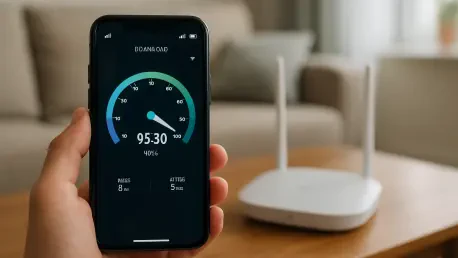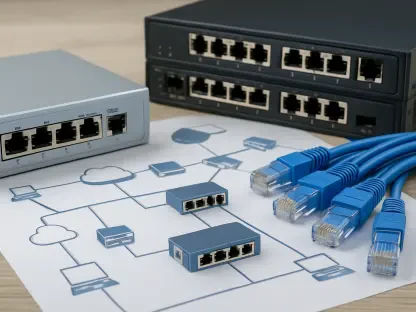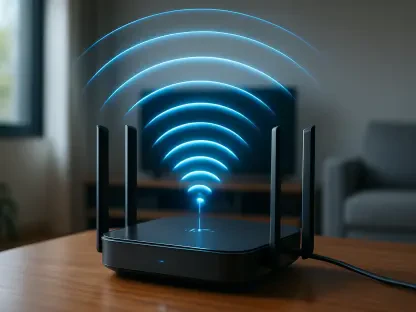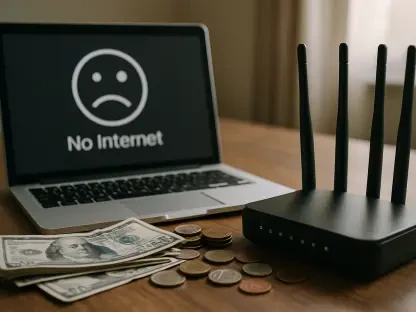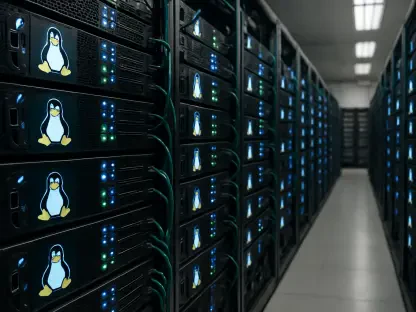Imagine stepping into a hotel for a crucial business meeting, only to find the Wi-Fi connection so sluggish that a simple video call becomes an ordeal of dropped signals and frustration, a scenario all too familiar for travelers and professionals who rely on consistent internet access in public and residential spaces like airports, office complexes, and apartment buildings. Ookla, a global authority in network benchmarking known for its widely used Speedtest tool, has stepped in to address this pervasive issue with a pioneering initiative. The Speedtest Certified Wi-Fi Program aims to evaluate and certify the quality of Wi-Fi networks across various venues and multi-dwelling units (MDUs), setting a dependable standard for connectivity. By leveraging technology from Ekahau, a Wi-Fi testing and design company under Ookla’s umbrella, this program promises to transform how consumers choose locations based on internet reliability and how property owners market their spaces.
Addressing Connectivity Challenges
Tackling Consumer Frustrations
The persistent problem of unreliable Wi-Fi in public spaces has long been a source of irritation for consumers, whether it’s a hotel with spotty service during a critical work trip or an airport lounge where even basic browsing is a struggle. Ookla’s latest certification program directly targets this frustration by offering a trusted seal of approval for venues that meet stringent connectivity standards. Consumers can now look for the Speedtest Certified logo when booking accommodations or selecting event spaces, confident that the network has been rigorously tested for performance. This transparency is a game-changer, as it eliminates the guesswork surrounding internet quality in unfamiliar locations. Beyond just convenience, it empowers users to make informed decisions, prioritizing venues that guarantee a seamless digital experience for everything from streaming to remote work.
Another angle to consider is the broader impact on consumer trust in an era where digital connectivity is non-negotiable. Poor Wi-Fi often leads to dissatisfaction that can tarnish a venue’s reputation, as negative reviews about internet issues spread quickly online. With Ookla’s certification, there’s a shift toward accountability, as venues must prove their network capabilities to earn the distinction. This initiative not only addresses immediate connectivity needs but also fosters a culture of reliability, encouraging businesses to invest in better infrastructure. For travelers and residents alike, the program offers peace of mind, ensuring that the places they choose to stay or visit are equipped to handle modern digital demands without hiccups or interruptions.
Building Trust Through Transparency
The frustration of inconsistent Wi-Fi often extends beyond mere inconvenience, affecting critical tasks like virtual meetings or urgent communications in professional and personal contexts. Ookla’s certification program serves as a beacon of reliability, providing a recognizable benchmark that consumers can depend on when navigating their options. This isn’t just about labeling a network as “good enough”; it’s about creating a standard that reassures users before they even connect. The Speedtest Certified designation could become as influential as other trusted indicators in hospitality and real estate, guiding decisions with clarity. It’s a step toward eliminating the uncertainty that plagues many when choosing a venue, ensuring that connectivity is no longer a gamble but a guaranteed asset.
Moreover, this initiative reflects a growing expectation for seamless internet access as a fundamental service, akin to electricity or running water in modern spaces. The certification process signals to consumers that a venue values their digital needs, potentially reshaping expectations across industries like hospitality and property management. By addressing a pain point that resonates with millions, Ookla positions itself as a mediator between user demands and venue offerings. This trust-building measure not only benefits those seeking reliable Wi-Fi but also sets a precedent for how technology can bridge gaps in service quality, paving the way for more consumer-centric solutions in the connectivity landscape.
Benefits for Property Owners
A Competitive Edge Through Certification
For property owners managing hotels, apartment complexes, or event spaces, the Speedtest Certified logo represents a powerful tool to differentiate themselves in a crowded market. In an age where reliable internet is often a top priority for guests and tenants, displaying this certification can attract tech-savvy customers who value connectivity as much as traditional amenities like location or price. Much like star ratings or positive reviews, the logo acts as a visible assurance of quality, potentially influencing booking decisions and boosting occupancy rates. This advantage is particularly significant in competitive sectors like hospitality, where standing out can mean the difference between a full house and empty rooms.
Beyond mere attraction, the certification also offers a strategic marketing opportunity for venues to position themselves as leaders in digital infrastructure. Property owners can highlight their commitment to providing top-tier Wi-Fi in promotional materials, appealing to business travelers, remote workers, and residents who depend on consistent access. This not only enhances a venue’s reputation but also justifies potential investments in network upgrades, as the return comes in the form of increased customer satisfaction and loyalty. By aligning with Ookla’s program, businesses signal that they prioritize modern needs, turning a technical certification into a tangible asset that drives revenue and builds brand trust in a digital-first world.
Enhancing Market Appeal
The value of being Speedtest Certified extends into the realm of long-term business growth, as property owners can leverage this status to appeal to a demographic that increasingly bases decisions on connectivity quality. For instance, a conference center with certified Wi-Fi could become the preferred choice for corporate events, where reliable internet is critical for presentations and live streams. Similarly, apartment buildings boasting this certification might attract young professionals or students who rely on robust networks for work and study. This targeted appeal can translate into higher demand, allowing owners to command premium rates or secure longer-term commitments from tenants and clients.
Additionally, the certification fosters a ripple effect across industries by raising the bar for what constitutes a desirable venue. As more properties adopt this standard, it could create a competitive push for others to follow suit, ultimately benefiting consumers with better connectivity options. For property owners, this means staying ahead of the curve by embracing the program early, establishing themselves as innovators in customer experience. The Speedtest Certified logo isn’t just a badge; it’s a statement of intent to meet evolving expectations, ensuring that a venue remains relevant and attractive in a market where digital access is often the deciding factor for many.
Inside the Certification Process
Rigorous Testing Standards
The backbone of Ookla’s Speedtest Certified program lies in its meticulous evaluation process, designed to ensure that only top-performing Wi-Fi networks earn the distinction. Utilizing advanced tools from Ekahau, the certification involves comprehensive on-site assessments that scrutinize multiple facets of a network’s performance. Key areas of focus include Wi-Fi radio frequency quality, network configuration, speed metrics, backhaul service capacity, and security protocols. This multi-layered approach guarantees that certified networks aren’t just fast on paper but deliver consistent, reliable, and safe connectivity in real-world conditions. It’s a standard that goes beyond surface-level measurements, aiming to reflect the actual user experience in diverse settings.
Equally important is the emphasis on thoroughness during these assessments, as Ookla aims to eliminate any doubt about a network’s capabilities. The process includes verifying location-specific details and generating detailed performance reports that provide a clear picture of a venue’s connectivity strengths and weaknesses. Only those networks meeting or exceeding predefined benchmarks receive certification, ensuring that the Speedtest Certified label carries weight and credibility. This rigorous methodology reassures both consumers and property owners that the certification isn’t a mere formality but a genuine marker of quality, setting a high bar for what constitutes acceptable Wi-Fi performance in today’s digital landscape.
Evolving and Adaptable Benchmarks
A standout feature of Ookla’s certification program is its dynamic nature, ensuring that standards remain relevant amid rapid advancements in Wi-Fi technology. The certification is valid for one year, after which venues must undergo renewal to maintain their status, keeping them accountable for sustained performance. Moreover, Ookla describes its benchmarks as a “living standard,” meaning they adapt over time to incorporate new technological developments and user expectations. This forward-thinking approach prevents the certification from becoming outdated, ensuring that certified networks continue to meet cutting-edge criteria as connectivity demands evolve.
Another critical aspect is the program’s flexibility to accommodate the unique characteristics of different environments, from sprawling university campuses to confined cruise ships. Tailoring assessments to specific settings ensures that the certification is practical and applicable across a wide range of venues, whether they serve transient guests or long-term residents. This adaptability underscores Ookla’s commitment to relevance, recognizing that a one-size-fits-all model wouldn’t suffice in the diverse world of public and private spaces. By balancing consistency with customization, the program maintains its integrity while addressing the nuanced needs of varied locations, solidifying its role as a trusted standard.
Future Expansion and Broader Scope
Incorporating Cellular Performance
Looking to the horizon, Ookla has ambitious plans to broaden the scope of its Speedtest Certified program by integrating cellular performance testing into the evaluation process. In today’s interconnected world, users frequently toggle between Wi-Fi and mobile data, especially in venues like stadiums or transit hubs where seamless connectivity across both is essential. By including cellular metrics, the program aims to offer a more holistic assessment of a location’s overall network quality, addressing the interplay between these two critical forms of access. This expansion reflects an understanding of modern connectivity needs, where a comprehensive evaluation can provide greater value to both consumers and businesses.
The addition of cellular testing also positions the program as a potential game-changer in setting industry-wide standards for venue connectivity. As mobile networks continue to evolve with technologies like 5G, incorporating these assessments ensures that certified locations remain at the forefront of performance expectations. This forward-looking strategy could redefine how venues approach their digital infrastructure, encouraging investments in both Wi-Fi and cellular capabilities. For consumers, it means greater assurance that a certified venue supports all aspects of their connectivity needs, whether they’re streaming on Wi-Fi or relying on mobile data during peak usage times, paving the way for a more integrated digital experience.
Pioneering Comprehensive Connectivity
Expanding into cellular performance testing isn’t just an add-on; it’s a strategic move to address the complexities of modern network usage in diverse environments. Venues like event spaces or office complexes often face challenges with indoor mobile signal strength and carrier variability, which can impact user satisfaction as much as Wi-Fi quality. By tackling these factors, Ookla’s program could establish a new benchmark for what constitutes a fully connected location, pushing property owners to optimize every facet of their digital offerings. This comprehensive approach ensures that certification reflects real-world usability, where seamless transitions between network types are increasingly vital.
Furthermore, this evolution of the program highlights Ookla’s intent to lead in connectivity evaluation, anticipating future trends where hybrid network reliance becomes the norm. As more devices and applications demand robust access across Wi-Fi and cellular, a certification that accounts for both will likely gain traction among venues seeking to future-proof their appeal. This initiative could also spur collaboration with mobile carriers and technology providers, creating a broader ecosystem of stakeholders invested in connectivity excellence. Ultimately, it sets the stage for a certification that doesn’t just react to current needs but shapes the expectations of tomorrow’s digital landscape.
Business Model and Industry Impact
Sustainable Growth Through Partnerships
Underpinning the Speedtest Certified program is a well-structured revenue model that supports its scalability and long-term viability. Ookla charges property owners fees for initial assessments and annual renewals, ensuring a steady income stream while incentivizing venues to maintain high standards. Additionally, partnerships with system integrators, who use Ekahau tools to conduct testing, create a decentralized network of professionals capable of scaling the program across regions and industries. These partnerships not only generate licensing revenue but also expand the program’s reach, as integrators incorporate certification into their service offerings for Wi-Fi design and commissioning.
This dual revenue structure is designed to encourage widespread adoption while maintaining the program’s credibility through professional execution. System integrators act as ambassadors of the certification, bringing expertise and local presence to the assessment process, which helps Ookla manage a growing demand without compromising quality. For the industry, this model fosters a collaborative environment where technology providers and property managers work together toward a common goal of better connectivity. The result is a sustainable framework that balances financial incentives with the mission to elevate network standards, potentially transforming how connectivity is prioritized across sectors.
Driving Industry-Wide Standards
The business model behind Ookla’s certification program also carries significant implications for setting new industry norms around connectivity quality. By creating a financial incentive for property owners to achieve and maintain certification, it encourages a proactive approach to network investment, shifting Wi-Fi from a secondary amenity to a core competitive factor. This shift could prompt a domino effect, where uncertified venues feel pressure to upgrade their infrastructure to remain relevant, ultimately raising the baseline for internet quality in public and residential spaces. The involvement of system integrators further amplifies this impact, as their expertise ensures consistent application of standards across diverse markets.
Beyond immediate business benefits, the program’s structure positions Ookla as a catalyst for broader change in how connectivity is perceived and valued. As more venues adopt the certification, it could become a de facto requirement in sectors like hospitality or real estate, much like safety or environmental certifications have in other contexts. This industry-wide push not only benefits consumers with better access but also drives innovation among network providers and integrators to meet evolving benchmarks. Reflecting on the program’s launch, it’s clear that Ookla took a bold step to address a critical need, and its success hinged on creating a model that aligned economic incentives with the pursuit of connectivity excellence.
